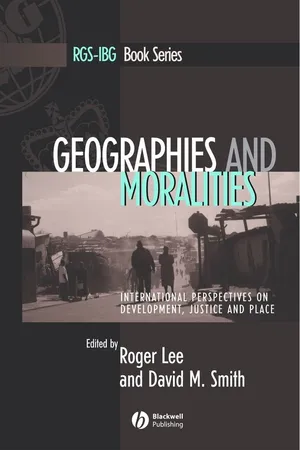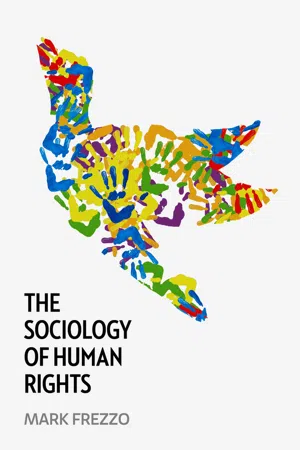Geography
Human Rights
Human rights are fundamental rights and freedoms that every person is entitled to, regardless of their nationality, gender, race, or religion. These rights include the right to life, liberty, and security, as well as freedom of expression, belief, and assembly. They are protected by international law and are essential for promoting equality, justice, and dignity for all individuals.
Written by Perlego with AI-assistance
Related key terms
2 Key excerpts on "Human Rights"
- eBook - ePub
Geographies and Moralities
International Perspectives on Development, Justice and Place
- Roger Lee, David M. Smith(Authors)
- 2011(Publication Date)
- Wiley-Blackwell(Publisher)
Human Rights are often taken to be universal, but Rex Honey (Chapter 8) explains that the rights which actually exist in international and domestic agreements are socially constructed. It is not the rights themselves that are permanent features of life, but cultural struggles involving conflict over what constitutes a just society. Rights actually recognized can change over time, as they do from place to place. Nigeria provides an illustration of cultural struggles over Human Rights, among population groups within the country and in relation to external standards, demonstrating the significance of geographical scale to moral geographies.The other three chapters address rights to land. Avery Kolers (Chapter 9) is concerned with ‘territorial justice’ in the sense of the just distribution of territory. Overcoming what he terms the ‘Anglo-American ethnogeography’, which views land as merely a passive resource to be allocated by market forces, leads to recognition of the kind of broader claims to territory which should be taken seriously in the resolution of disputes. Shlomo Hasson (Chapter 10) describes a particularly demanding case of conflict with a territorial basis, in the city of Jerusalem, not only between Jews and Palestinian Arabs but also between Jews of different religious orientation. He argues for an ethical approach which avoids absolute winners and losers, in favour of recognition of the rights of both sides. Brij Maharaj (Chapter 11) turns to reparation as an aspect of social justice, raising issues of rights in relation to dispossession of land in South Africa under apartheid. He examines the policies and mechanisms developed to address land reform and restitution, as part of a process of societal healing.The very question of Human Rights, let alone their realization in thought and practice and the establishment of institutions devoted to their implementation, is far from unproblematic in the contemporary world. The notion of Human Rights reminds us in the most direct fashion that human life is social and that such rights are socially constructed – and, in part at least, socially structured in terms of what might be possible in any context. Here morality and ethics are very evident; their inherent spatiality is clear and their uneven and dynamic geography is all too apparent.REFERENCESHarvey, D. (1973) Social Justice and the City - eBook - ePub
- Mark Frezzo(Author)
- 2014(Publication Date)
- Polity(Publisher)
Deriving from a practical interpretation of the UDHR that stressed the need to compare the performance of different regimes, this tendency was formalized in Vasak’s (1977) influential approach. By dividing Human Rights into these three categories, and hence mimicking the format of the early constitutions of the US, France, and other countries that were influenced by the European Enlightenment, scholars, policymakers, and others have been able to appeal to nation-states for specific pieces of legislation to alleviate political exclusion and an array of social problems. At the same time, the Human Rights community has come to see the limitations of these categories, especially as globalization has revealed an array of alternative conceptions of Human Rights emanating from the Global South (Desai 2002). These ideas have found expression not only in social movements, but also in the platforms of political parties and the language of new constitutions (especially in Latin America). This has precipitated a sea change in Human Rights thinking.SummaryTo reiterate, this chapter has defined the sociology of Human Rights fundamentally as the systematic use of sociological theories and methods in the analysis of the social conditions under which Human Rights are imagined, contested, implemented, enforced, and transgressed. Accordinglrights-oriented tedsociologists examine rights conditions (i.e., the circumstances giving rise to grievances), rights claims (i.e., the demands for protections and entitlements that aggrieved groups make on governments), rights effects (i.e., alterations in political structures and social relations deriving from the attainment of rights by aggrieved groups), and rights bundles (i.e., parcels of organically connected rights that transcend the conventional categories). Taken together, these four concepts – rights conditions, rights claims, rights effects, and rights bundles – form the foundation of the sociological perspective on Human Rights. Accordingly, we will employ these concepts throughout the book.
Learn about this page
Index pages curate the most relevant extracts from our library of academic textbooks. They’ve been created using an in-house natural language model (NLM), each adding context and meaning to key research topics.

